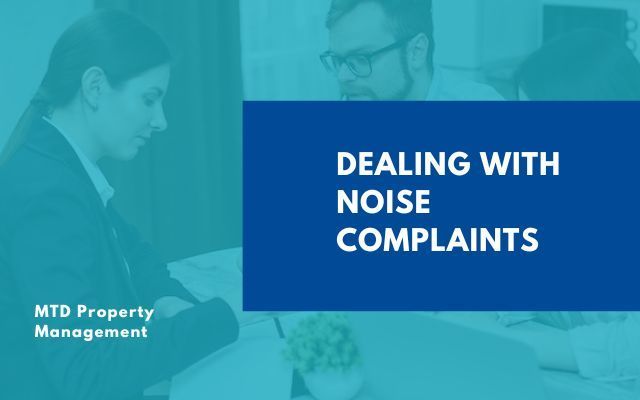Dealing With Noise Complaints

If you have any experience managing properties, you’ll know that dealing with noise complaints is part of the job. If any of your tenants get a bit loud on a Friday night, you might hear about it the next day from one of their neighbors.
So, how should you handle noise complaints and protect your tenants' right to quiet enjoyment? Using our experience in the Chicago rental market, MTD Property Management has put together the following tips.
Assessment of the Noise Disturbance
As a landlord, it’s your responsibility to ensure all your tenants use their space in a respectful manner, without encroaching on another renter’s comfort. There are also county rules and regulations to follow when it comes to noise levels and the
implied covenant of quiet enjoyment.
Upon receiving a noise complaint, the first step should be to assess its severity. If possible, you should head down to the rental property and assess it first-hand. This will help you, as a landlord, gain perspective of the situation and help in the de-escalation.
It is recommended to avoid taking action before assessing the severity of the noise complaint, as it might be the result of personal issues between two residents or an overreactions to everyday noise. Contact neighbors and/or other tenants in the area and ask if they have noticed a similar noise issue.
Some of the common complaints include:
- Parties. It’s within a tenant’s right to invite a few people over, as long as the noise generated is controlled and the party doesn’t continue into unreasonable hours. Certain exemptions, such as holidays, should be considered.

- Footsteps. This is a common noise complaint on multi-tenant rental properties. Hearing a fellow tenant moving around their unit is completely normal, but instances of jumping or stomping around in the middle of the night from a noisy tenant would need to be addressed.
- Dogs. Choosing to be a pet-friendly property comes with its own set of benefits. However, failure to complete a proper pet screening could lead to hosting a pet that barks at any time of the day and night. It’s advised to investigate the matter and find a permanent solution for it.
- Arguments. There are bound to be disagreements between household members. However, it’s important to have a plan of action ready should these conflicts ever escalate, especially at odd hours of the night.
Unjustified Complaints
It’s possible you might occasionally encounter unjustified noise complaints. If, as the landlord, you find no evidence that implies a noise complaint after completely assessing the situation, you should explain your conclusion to the complainant.
Be sure to remain calm if you get any pushback from the complainant, and communicate your findings in a rational way. If things work out, you should reach an agreement and go your separate ways.
Justified Complaints
If the noise complaint is justified, how landlords address the issue depends on the severity of the matter as well as the frequency of such happenings.

It’s possible the noise complaint is an outlier for a one-time offender who invited a few friends over for the night and got carried away. Giving them a call might be enough for them to reduce their noise levels and keep the party contained.
However, if the offender in question has already been the subject of multiple noise disturbances, it might be necessary to take additional action. If landlords have talked to the tenant a number of times about excessive and unnecessary noise without success, it might be time to consider evicting them.
Be sure to familiarize yourself with Illinois’ landlord-tenant laws to remain compliant with its eviction provisions, and rely on the experience and expertise of a local property professional. Grounds for eviction must be included in the lease agreement.
The Power of the Lease Agreement
A
lease describes the obligations and responsibilities that the landlord and tenant must perform. Once signed, a lease agreement is legally binding. Thus, it’s vital, as a landlord, to know
what to include in your rental agreement to best protect your investment.
Including noise clauses in your rental agreement could make it easier to handle such issues down the line, and it guarantees a quality experience for your tenants. Making it clear that you foster a calm and respectful environment might also inspire residents to renew their lease upon expiry.
As a landlord, it’s also important that you stay up to date on local provisions regarding noise ordinances. Provide your tenants with updates from time to time to build a good relationship and avoid any potential loopholes.

Bottom Line
Once landlords receive a noise complaint, be it from a tenant or other neighbor in the area, the first thing they should do is assess the severity of the complaint and ensure that a tenants right to quiet enjoyment is protected. You’ll find there’s no one-fit-all solution. Be ready to use your experience to determine whether the noise disturbances are justified and provide appropriate disciplinary action as needed.
Strengthening your
tenant screening procedure and customizing your lease agreement could help prevent noise complaints. Should you require assistance with any property management services, you can rely on the experience and expertise of
MTD Property Management. We are a full-service property management company operating in Chicago.
For comprehensive property management of your Chicago rentals, get in touch with us today!









